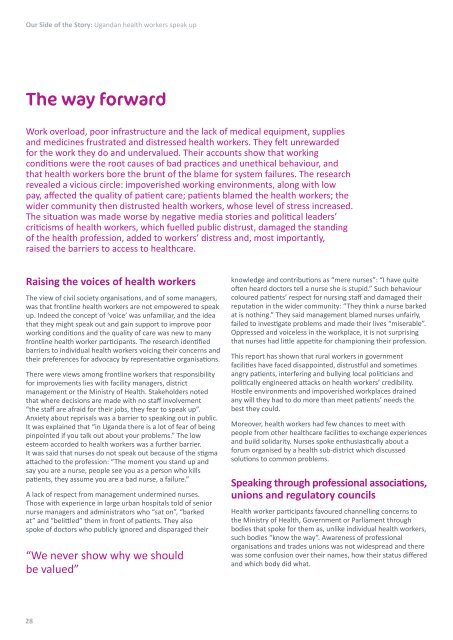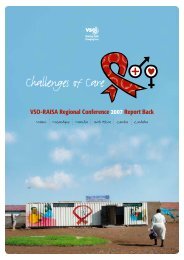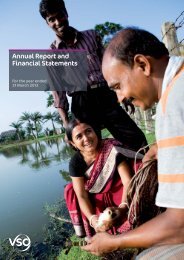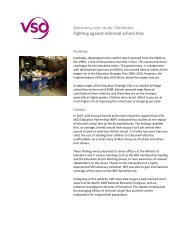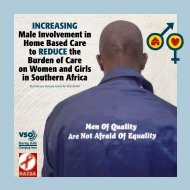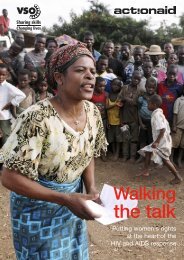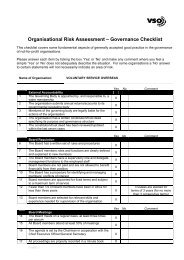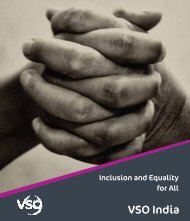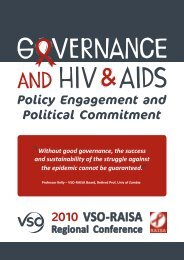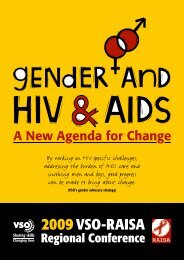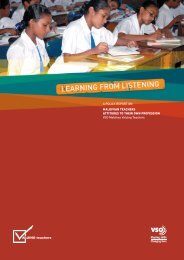Our Side of the Story - Ugandan health workers speak up - VSO
Our Side of the Story - Ugandan health workers speak up - VSO
Our Side of the Story - Ugandan health workers speak up - VSO
Create successful ePaper yourself
Turn your PDF publications into a flip-book with our unique Google optimized e-Paper software.
<strong>Our</strong> <strong>Side</strong> <strong>of</strong> <strong>the</strong> <strong>Story</strong>: <strong>Ugandan</strong> <strong>health</strong> <strong>workers</strong> <strong>speak</strong> <strong>up</strong><br />
The way forward<br />
Work overload, poor infrastructure and <strong>the</strong> lack <strong>of</strong> medical equipment, s<strong>up</strong>plies<br />
and medicines frustrated and distressed <strong>health</strong> <strong>workers</strong>. They felt unrewarded<br />
for <strong>the</strong> work <strong>the</strong>y do and undervalued. Their accounts show that working<br />
conditions were <strong>the</strong> root causes <strong>of</strong> bad practices and unethical behaviour, and<br />
that <strong>health</strong> <strong>workers</strong> bore <strong>the</strong> brunt <strong>of</strong> <strong>the</strong> blame for system failures. The research<br />
revealed a vicious circle: impoverished working environments, along with low<br />
pay, affected <strong>the</strong> quality <strong>of</strong> patient care; patients blamed <strong>the</strong> <strong>health</strong> <strong>workers</strong>; <strong>the</strong><br />
wider community <strong>the</strong>n distrusted <strong>health</strong> <strong>workers</strong>, whose level <strong>of</strong> stress increased.<br />
The situation was made worse by negative media stories and political leaders’<br />
criticisms <strong>of</strong> <strong>health</strong> <strong>workers</strong>, which fuelled public distrust, damaged <strong>the</strong> standing<br />
<strong>of</strong> <strong>the</strong> <strong>health</strong> pr<strong>of</strong>ession, added to <strong>workers</strong>’ distress and, most importantly,<br />
raised <strong>the</strong> barriers to access to <strong>health</strong>care.<br />
Raising <strong>the</strong> voices <strong>of</strong> <strong>health</strong> <strong>workers</strong><br />
The view <strong>of</strong> civil society organisations, and <strong>of</strong> some managers,<br />
was that frontline <strong>health</strong> <strong>workers</strong> are not empowered to <strong>speak</strong><br />
<strong>up</strong>. Indeed <strong>the</strong> concept <strong>of</strong> ‘voice’ was unfamiliar, and <strong>the</strong> idea<br />
that <strong>the</strong>y might <strong>speak</strong> out and gain s<strong>up</strong>port to improve poor<br />
working conditions and <strong>the</strong> quality <strong>of</strong> care was new to many<br />
frontline <strong>health</strong> worker participants. The research identified<br />
barriers to individual <strong>health</strong> <strong>workers</strong> voicing <strong>the</strong>ir concerns and<br />
<strong>the</strong>ir preferences for advocacy by representative organisations.<br />
There were views among frontline <strong>workers</strong> that responsibility<br />
for improvements lies with facility managers, district<br />
management or <strong>the</strong> Ministry <strong>of</strong> Health. Stakeholders noted<br />
that where decisions are made with no staff involvement<br />
“<strong>the</strong> staff are afraid for <strong>the</strong>ir jobs, <strong>the</strong>y fear to <strong>speak</strong> <strong>up</strong>”.<br />
Anxiety about reprisals was a barrier to <strong>speak</strong>ing out in public.<br />
It was explained that “in Uganda <strong>the</strong>re is a lot <strong>of</strong> fear <strong>of</strong> being<br />
pinpointed if you talk out about your problems.” The low<br />
esteem accorded to <strong>health</strong> <strong>workers</strong> was a fur<strong>the</strong>r barrier.<br />
It was said that nurses do not <strong>speak</strong> out because <strong>of</strong> <strong>the</strong> stigma<br />
attached to <strong>the</strong> pr<strong>of</strong>ession: “The moment you stand <strong>up</strong> and<br />
say you are a nurse, people see you as a person who kills<br />
patients, <strong>the</strong>y assume you are a bad nurse, a failure.”<br />
A lack <strong>of</strong> respect from management undermined nurses.<br />
Those with experience in large urban hospitals told <strong>of</strong> senior<br />
nurse managers and administrators who “sat on”, “barked<br />
at” and “belittled” <strong>the</strong>m in front <strong>of</strong> patients. They also<br />
spoke <strong>of</strong> doctors who publicly ignored and disparaged <strong>the</strong>ir<br />
“We never show why we should<br />
be valued”<br />
knowledge and contributions as “mere nurses”: “I have quite<br />
<strong>of</strong>ten heard doctors tell a nurse she is st<strong>up</strong>id.” Such behaviour<br />
coloured patients’ respect for nursing staff and damaged <strong>the</strong>ir<br />
reputation in <strong>the</strong> wider community: “They think a nurse barked<br />
at is nothing.” They said management blamed nurses unfairly,<br />
failed to investigate problems and made <strong>the</strong>ir lives “miserable”.<br />
Oppressed and voiceless in <strong>the</strong> workplace, it is not surprising<br />
that nurses had little appetite for championing <strong>the</strong>ir pr<strong>of</strong>ession.<br />
This report has shown that rural <strong>workers</strong> in government<br />
facilities have faced disappointed, distrustful and sometimes<br />
angry patients, interfering and bullying local politicians and<br />
politically engineered attacks on <strong>health</strong> <strong>workers</strong>’ credibility.<br />
Hostile environments and impoverished workplaces drained<br />
any will <strong>the</strong>y had to do more than meet patients’ needs <strong>the</strong><br />
best <strong>the</strong>y could.<br />
Moreover, <strong>health</strong> <strong>workers</strong> had few chances to meet with<br />
people from o<strong>the</strong>r <strong>health</strong>care facilities to exchange experiences<br />
and build solidarity. Nurses spoke enthusiastically about a<br />
forum organised by a <strong>health</strong> sub-district which discussed<br />
solutions to common problems.<br />
Speaking through pr<strong>of</strong>essional associations,<br />
unions and regulatory councils<br />
Health worker participants favoured channelling concerns to<br />
<strong>the</strong> Ministry <strong>of</strong> Health, Government or Parliament through<br />
bodies that spoke for <strong>the</strong>m as, unlike individual <strong>health</strong> <strong>workers</strong>,<br />
such bodies “know <strong>the</strong> way”. Awareness <strong>of</strong> pr<strong>of</strong>essional<br />
organisations and trades unions was not widespread and <strong>the</strong>re<br />
was some confusion over <strong>the</strong>ir names, how <strong>the</strong>ir status differed<br />
and which body did what.<br />
28


